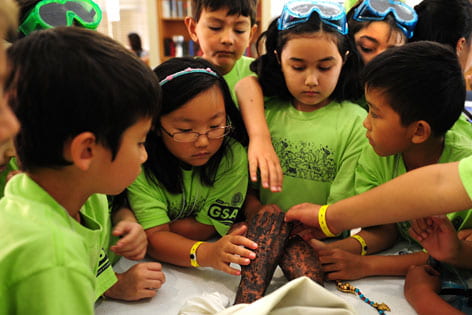Gifted Students Academy nurtures young minds
Mummies, eyeballs and all manner of mysteries are part of UCI’s summer Gifted Students Academy Exploratorium.

Ancient Egypt: pharaohs, mummies, pyramids – and sheep’s eyeballs? That’s what awaited two dozen 6- to 9-year-olds who filed into UC Irvine’s book-lined Bucklebury classroom recently for the Gifted Students Academy Exploratorium.
The all-day summer program for eligible first- through fourth-graders consists of four one-week sessions, each with a different theme. So the gifted and talented youngsters who signed up to study ancient Egypt probably didn’t expect to find trays of ovine oculi at their seats.
The Exploratorium takes a multidisciplinary approach to education, integrating science, art, math, music, computers, creative writing, history, drama and recreation. Darlene Boyd, director of the academy for 17 years, says this “stimulates high interest and enhances concentration, while at the same time encouraging kids to think like scholars.”
The students dissecting eyeballs soon learned that eyes had powerful religious and cultural meaning to ancient Egyptians, who believed the sun and moon were eyes of the gods. The greenish-blue color of a sheep’s vitreous humor symbolized life and divinity – a fact the students would use in Egyptian jewelry-making that afternoon.
But first there was a (faux) mummy to unwrap. With children jostling for position, Curt Abdouch, the Exploratorium’s science coordinator, carefully placed the linen-shrouded figure on a table. “Was this a man or a woman?” he asked. “Was he or she rich or poor? And how did this person die?”
While teacher Summer Dadah ’91 played an Egyptian drum, awestruck students took turns peeling back strips of fabric to expose the mummy’s desiccated feet. They’d have to wait to unwrap the rest, as Abdouch planned a day-by-day reveal. Reluctantly, they turned their attention to hieroglyphic math.
The Gifted Students Academy – established more than 20 years ago “to bring the best and brightest to UCI at an early age,” according to Boyd – provides similarly innovative summer courses for eligible fifth- through eighth-graders.
Subjects include chemistry, physics, kinesiology, comedy writing, debate, forensic science, astronomy and literary analysis. To better replicate the university experience, older students can choose to live on campus for the week.
Under the auspices of the Center for Educational Partnerships, the academy also offers the Exploratorium program, a law academy and college prep classes on Saturdays during the school year. Nearly all academy instructors have advanced degrees, subject-matter expertise and training in gifted education.
UCI researchers and faculty members are often guest lecturers – among them Michael Dennin, physics & astronomy professor; David Gardiner, developmental & cell biology professor; and Dr. Baruch Kuppermann, ophthalmology professor.
Dennin, whose three children have attended both lower- and upper-level sessions, has been a speaker for four years. “It’s a nice chance to talk to a group of kids already excited about science,” he says.
Enrollment in the academy peaked at around 1,000 a few years ago but, due largely to the economic downtown, is now about 450. Many enthusiastic students return year after year.
Donica Garcia, 10, of Corona del Mar was spending her third summer in the Exploratorium. “I like making friends and learning about different places, animals and things,” she says. “The teachers explain stuff in fun ways. And we do things here that we wouldn’t do at school – like dissecting eyeballs!”